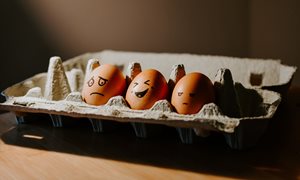
The Radboudumc is participating in a study, led by Amsterdam UMC, into a new, promising treatment for therapy-resistant obsessive-compulsive disorder. A sum of 2.8 million euros has been made available, with several other hospitals and mental healthcare institutions also participating.
A compulsive disorder can severely restrict a person's life and that of his or her loved ones. At least 100,000 people in the Netherlands suffer from an obsessive-compulsive disorder (OCD). It is characterized by disturbing compulsive thoughts and time-consuming compulsive actions that can be so disruptive that someone experiences a high pressure of suffering, often cannot work or study and becomes socially isolated. Roughly half of all people with an obsessive-compulsive disorder cannot be cured, or cannot be cured for a long time, using existing care (cognitive behavioral therapy and/or medication). For them, there is really no good alternative. The most far-reaching treatment - brain surgery or deep brain stimulation - is an option only for the most extreme cases.
Research group consists of 250 patients
Over the next few years, 250 patients will take part in the subsidized research into a new, promising treatment for OCD. The promising treatment in question is called repetitive transcranial magnetic stimulation, or rTMS. "We think we can better help the group that does not benefit sufficiently from cognitive behavioral therapy," says research leader and professor of neuropsychiatry Odile van den Heuvel (Amsterdam UMC) and Indira Tendolkar, professor of psychiatry at Radboudumc. "Using a magnetic field, we generate an electric current in the brain. With this we can stimulate the brain circuit that is responsible for control over emotions and behavior. We are going to bring the brain into an optimal state, as it were, to increase the effects of cognitive behavioral therapy." Patients will undergo rTMS treatment four times a week for a minimum of 5 weeks and a maximum of 7 weeks. Cognitive behavioral therapy will follow each session.
Long-term collaboration
Without the grant funding, this study would not have gotten off the ground, Van den Heuvel believes. If the study results show that rTMS is effective for the group of patients for whom nothing else helps at the moment, the treatment will be covered by basic insurance. "The subsidy also enables us as OCD clinics to really establish a national collaboration. I see this as an enormous catalyst, not only for this research but also for a long-term collaboration from which much can still emerge."
Related news items

Playing games to control emotions How cognitively demanding tasks can affect emotion regulation
19 April 2022 Cognitive reappraisal can help us to control our emotions. It involves recognizing negative thought patterns, and gradually changing them to more effective patterns. A new study shows how the cognitive load of reappraisal, rather than the reappraisal itself, affects our emotional processing. go to page
The effects of dopamine levels on reward responsivity
25 November 2021 To adapt to the ever-changing context in which we live, we are constantly deciding how much effort to put into performing our behavior, or how fast to perform our actions. How do people decide how fast to act and how does the brain compute this? Our researchers set out to investigate this. go to page
Adverse effects of Mindfulness-Based Cognitive Therapy in bipolar disorder
18 November 2021 Mindfulness is often described as “being aware of our present moment experience, in a friendly and non-judgmental way”. As research into mindfulness, and psychotherapy in general, has mainly been focused on positive outcomes, not much is known about the possibility of adverse effects. go to page

